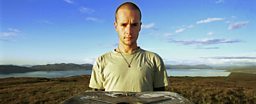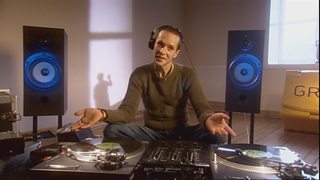Remembering Martyn Bennett: The rebirth of Grit
16 January 2015
The opening night of this year’s Celtic Connections festival in Glasgow featured a full orchestration of Martyn Bennett's last album, Grit, by cross-genre classical violinist Greg Lawson. Bennett died from cancer in 2005 at the age of 33. You can get a taste of the concert with a clip of the encore, while in a special film by NATALIE MOSS for BBC Arts, Lawson discusses how he reimagined the record credited with starting the musical evolution of Celtic fusion. We also present a selection of BBC archive performances and interviews. Below, folk journalist JIM GILCHRIST tells the story of the man behind the album and chooses his highlights from this year's festival programme.

Martyn Bennett, a virtuosic and iconoclastic piper, fiddler, composer and studio mixer, died on 30 January 2005, three weeks short of his 34th birthday, after a long and courageous struggle with cancer. It was the last day of that year’s Celtic Connections festival in Glasgow.
On Thursday, 15 January, Celtic Connections, now the largest winter music festival of its kind, marked the tenth anniversary of Bennett’s untimely passing with an ambitious concert hall recreation of his last album, Grit, which was a spectacular splicing of archived traditional song recordings with uncompromising electronic samples and beats.

It was as a formidable and hugely influential piper and live performer that Bennett made his reputation
The orchestration was arranged by Greg Lawson, a friend of Bennett’s and a notable musician in his own right, playing with such diverse outfits as the BBC Scottish Symphony Orchestra, the left-field McFall’s Chamber and the klezmer band Moishe’s Bagel.
It is a reflection on the vividly engrossing and bewildering tapestry of interwoven sound that is Grit, that Lawson’s arrangement of the album will utilise some 80 musicians.
While Grit was a triumph of musical intuition and mixing desk magic, it was as a formidable and hugely influential piper and live performer that Bennett made his reputation, becoming known as 'the techno piper', a dreadlocked iconoclast who took clubs and folk festivals alike by storm, combining his superb piping technique with a beefy sound system and an arsenal of beats and samples.
His now legendary appearance at the 2000 Cambridge Folk Festival was reported by Mojo magazine: “Half the audience fled in fear of their lives ... Scots music has never sounded like this before. No music has ever sounded like this before.”
Born in St John’s, Newfoundland, Bennett moved at the age of six to Scotland with his mother, the Skye-born Gaelic singer and folklorist Margaret Bennett, and had his first lessons on the great Highland bagpipe while growing up in Kingussie.
He proved a startlingly adept student and later studied violin, piano and composition at the City of Edinburgh Music School , based at Broughton High School, before going on to graduate from the RSAMD (now the Royal Conservatoire of Scotland) in Glasgow, while immersing himself in extra-curricular traditional music sessions and the burgeoning club dance scene.
A sequence of albums saw him mixing beat-propelled pipe tunes with glowing soundscapes cusping the poetry of Hamish Henderson and Sorley MacLean.
His more barnstorming excursions tended to overshadow his gifts as a composer combining pipes with orchestral forces, which produced such gems as his Piece for String Quartet, Percussion and Scottish Smallpipes.
The beautiful McKay’s Memoirs, involving pipes, clarsach, strings and percussion, marked the centenary of his alma mater, Broughton High School, but also enjoyed a heady performance as part of the celebrations for the opening of the new Scottish Parliament in July 1999.

By the time he came to make Grit, Bennett was so ill with Hodgkin’s lymphoma that he was virtually unable to play his instruments
By the time he came to make Grit, Bennett was so ill with Hodgkin’s lymphoma that he was virtually unable to play his instruments, so utilised his studio skills, combining the archived recorded voices of traditional singers – some of whom he had known personally – with often explosive electronic grooves.
Nae Regrets, for instance, interleaved the rambunctious Dundonian tones of singer Annie Watkins with thunderous choruses of Edith Piaf’s Non, je ne regrette rien, while arguably the most potent track, Liberation, intermingled recordings of two Gaelic women singing Psalm 118 with the gravelly tones of Michael Marra intoning the English translation. As an album, the more you listen to it, the more you discover.
Bennett’s brilliance and impish subversiveness belied a real seriousness of cultural purpose.
In his sleeve notes for Grit, he wrote: “In recent years so many representations of Scotland have been misty-lensed and fanciful to the point that the word ‘Celtic’ has really become a cloudy pigeon hole. This album was a chance for me to present a truthful picture, yet face my own reflection in the great mirror of all cultures.”
He dedicated the album to the poet and folklorist Hamish Henderson, who died the year before the its release, but who declared, on Bennett playing him an early demo: “What brave new music.”
Jim Gilchrist writes a weekly folk and jazz column for The Scotsman.
Watch the concert
-
![]()
Opening Concert: Martyn Bennett - Grit
Presented by Mary Ann Kennedy, this programme brings you to the heart of the action at the Glasgow Royal Concert Hall. The show was broadcast on BBC Two Scotland on Thursday 22 January, and is available on iPlayer until 21 February.
From the archive
Six of the fest
Glasgow’s Celtic Connections is an 18-day, 24-venue celebration of 'Celtic' and virtually any other kind of roots music you can think of, from the Hebrides to the Antipodes. Jim Gilchrist selects some highlights from the line-up:

Angélique Kidjo with the Royal Scottish National Orchestra
17 January, Glasgow Royal Concert Hall
The Grammy-winning Beninoia diva Angélique Kidjo teams up with the ranks of the Royal Scottish National Orchestra to reprise some of her best-known songs.
Ganesh Kumaresh with Trio AAB
17 January, The Mackintosh Church
A cross-cultural sibling gathering, as Charles Rennie Mackintosh’s gem of a church hosts Indian violinist brothers Ganesh and Kumaresh Rajagopalan, plus percussionist Anantha R Krishnan, in collaboration with Scots jazz Trio AAB – twins Phil and Tom Bancroft on sax and drums and guitarist Kevin Mackenzie.
Carlos Núñez: The Atlantic Corridor
21 January, Glasgow Royal Concert Hall
Galician piping star Carlos Núñez explores the intriguing theory that the bagpipe arrived in Scotland by way of an Atlantic sea route, and that the gaita of north-west Spain is its closest relation.
Van Morrison
26 January, Glasgow Royal Concert Hall
The multiple-Grammy-winning troubadour of Celtic soul, Van the Man returns with songs from his latest album, Born to Sing: No Plan B, as well as classic back-catalogue material.
Usher’s Island
27 January, Old Fruitmarket
Stars of such revered Irish groups as Planxty and the Bothy Band, Donal Lunny, Andy Irvine and Paddy Glackin join a younger generation – Michael McGoldrick and John Doyle – in potent collaboration.
Transatlantic Sessions
31 January & 1 February, Glasgow Royal Concert Hall
Hosted by Aly Bain and Jerry Douglas, this popular two-night gathering of stars from both sides of the Pond includes Rodney Crowell and Patty Griffin from the States, as well as Gaeldom’s Kathleen MacInnes.
For details on these and all other concerts, visit the Celtic Connections website.
Celtic Connections on the BBC
-
![]()
Celtic Connections home
Details of all the BBC's coverage of this year's festival on TV, radio and online.
-
![]()
Nae Regrets
BBC Two Scotland televises the opening concert of Celtic Connections 2015.











